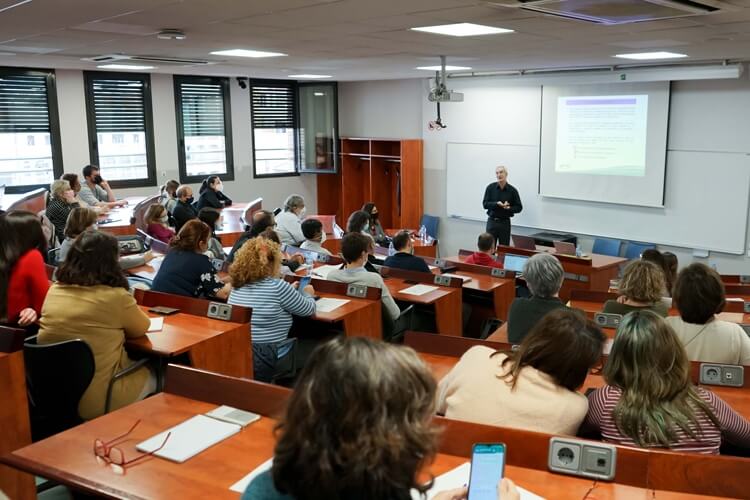Data Integrity Seminar
Our commitment to quality management has led us to organize an annual seminar dedicated to topics of interest for various industrial sectors related to the innovations and challenges we face. After being put on hold for two years due to the COVID-19 pandemic, we wanted to offer the seminar in a small format, yet with a high impact and number of attendees. We sought to underscore everyone’s desire to get out of our routines and videoconferences to meet and greet one another and share our professional experiences
Bearing in mind that “data integrity” is an issue that has taken on increased relevance for quality systems in recent years and will continue to grow in the future, we wanted to dedicate this year’s edition to it, which was held at the IQS campus this past March.
The attendees were welcomed by Dr Salvador Borrós, Director of IQS, who highlighted the school’s efforts as IQS is the only Spanish university that boasts GMP certification from the Spanish Agency for Medicines and Medicinal Products (AEMPS) and the Government of Catalonia’s Department of Health to conduct chemical analyses of medicines. In recent years, IQS has allocated vast resources to make the services it offers pharmaceutical companies a reality in achieving such a demanding quality standard in terms of data integrity. In fact, IQS further updated and enhanced its Data Integrity Policy last year.
José Ramón Martinez, from the consulting firm ASYVAL SL, gave a presentation explaining why data integrity is essential and underscoring its importance in decision-making. He stated, “the goal of data integrity is to ensure that data and records are complete, consistent, secure, and accurate and that they are available throughout their lifecycle.” Although the issue of data integrity is not a new topic for sectors such as pharmaceuticals, it is for other industrial sectors that are increasingly aware of the need to implement data integrity structures and methods to work better and avoid serious errors in decision-making. Highlighting leading concepts such as ALCOA (Attributable, Legible, Contemporaneous, Original, and Accurate) and risk analysis, the speaker emphasized critical thinking and the need to develop a cross-cutting culture of data integrity across entire organizations.
In the second presentation, Dr María Josefa Blanco, Director of the Quality Department at IQS, and Dr Judith Báguena shared the experience IQS has gained in the process of reviewing and launching its Data Integrity Policy that began in 2017, related to the laboratory analysis services offered by IQS Tech Transfer to the pharmaceutical and biomedical industries. The life cycle of the relevant GMP records and the subsequent risk analysis were described and examples were shown on how their definition and evaluation leads to the need to apply specific control measures that are prioritized and implemented, entering into a mechanism of monitoring and continuous improvement.
At the end of the seminar, a discussion was held with the attendees in the form of a roundtable session moderated by Dr Núria Vallmitjana, Director of IQS Tech Transfer, which was joined by Pharmaceutical Technical Director Dr Beatriz Artalejo in addition to the other speakers. Highlights included the importance of an organization’s culture and leadership.
“Things can be done well, but doing them even better is great too,” stated José Ramón Martínez.
Dr Núria Vallmitjana
Director of IQS Tech Transfer
This initiative has been possible thanks to the FORTUT project “FORTaleciendo Unidades de Transferencia de Tecnología” which is financed by the European Regional Development Fund, granted by the Government of Catalonia’s Department of Business and Knowledge through the Directorate General of Research (now the Department of Research and Universities). This financing forms part of the call for grants for the implementation of projects by Knowledge Transfer and Enhancements Units within Catalan Universities, aimed at significantly improving engagement with the productive sector (decision EMC/2970/2016, of 27 December).




